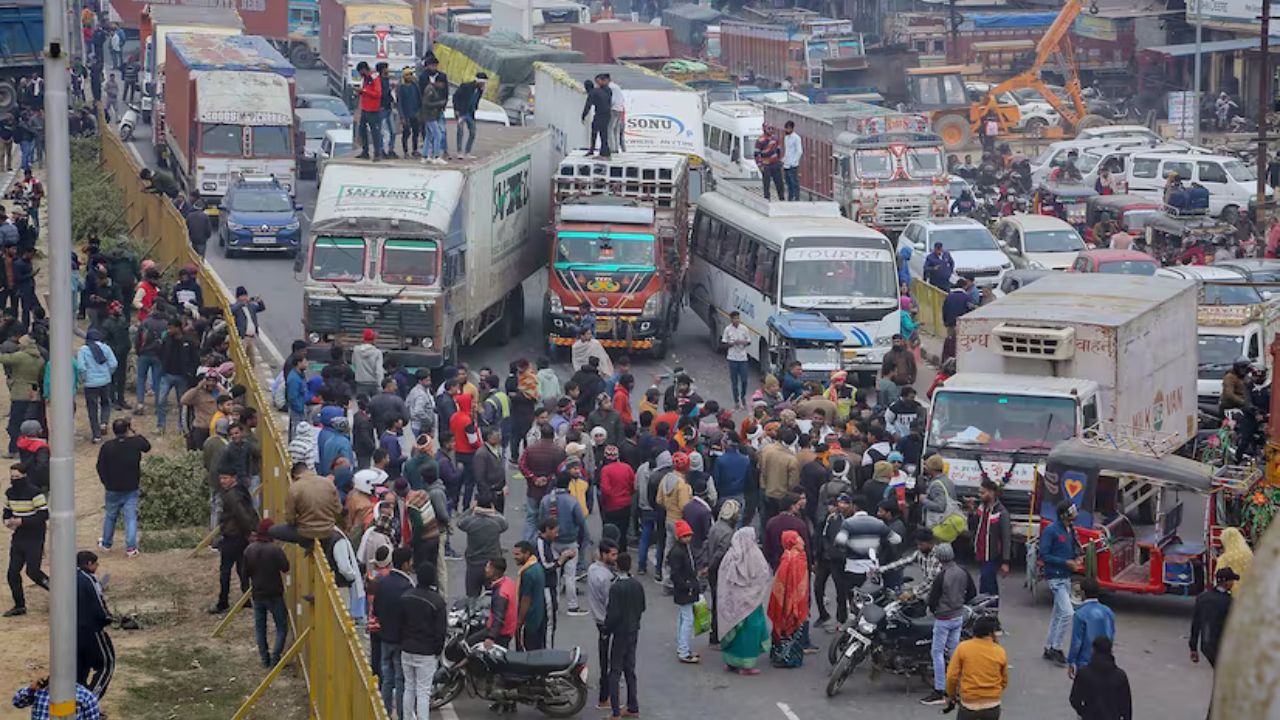The New Year began with a nationwide transportation strike across several states against the provision in the new penal law on hit-and-run law road accident cases.
In a second consecutive day of widespread disruption, truck and bus drivers, along with petrol pumps, are staging protests across the nation against the newly enacted Bharatiya Nyay Sanhita (BNS). The demonstrations have led to severe traffic disruptions, long queues at petrol pumps, and challenges for commuters as bus operators and drivers join the strike.
The focal point of the protests is the provision within the BNS that introduces harsh penalties for hit-and-run cases. Drivers now face the possibility of a 10-year jail term for fleeing and not reporting fatal accidents, a significant escalation from the previous maximum imprisonment of two years under IPC Section 304A (death by negligence).
The protesting drivers argue that these stringent penalties pose a serious threat to their livelihoods. “We only get Rs 10,000-12,000 as salary. How do I pay lakhs of rupees as a fine? We will be forced to do some other jobs if this decision is not rolled back. This is a threat to our livelihood,” expresses Jagat Pal Sharma, a 46-year-old truck driver.
WHAT DOES THE NEW LAW ON HIT-AND-RUN CASES SAY?
Under the Bharatiya Nyay Sanhita (BNS), which will replace the colonial era Indian Penal Code, drivers who cause a serious road accident by negligent driving and run away without informing the police or any official from the administration can face punishment of up to 10 years or a fine of Rs 7 lakh.
“Whoever causes the death of any person by doing any rash or negligent act not amounting to culpable homicide, shall be punished with imprisonment of either description for a term which may extend to seven years, and shall also be liable to fine,” the new legislation in the Bharatiya Nyaya Sanhita reads.
Earlier, individuals accused in hit-and-run cases were tried under Section 304A of the Indian Penal Code, facing penalties of up to two years in jail upon identification.
Reports of protests have emerged from various parts of the country, with transport unions and drivers claiming that the new law puts them in a precarious situation. They argue that staying at the scene of an accident may expose them to public lynching while fleeing, which could result in a decade-long jail term and heavy penalties.
In Bulandshahr, a group of drivers gathered on NH-34, causing traffic blockades in opposition to the controversial law. The situation is not expected to improve soon, as roadblockades and disruptions in the supply chain persist.
Transporters and drivers criticize the government for not consulting with stakeholders before amending the law. They highlight flaws in the legislation and stress that transporters and drivers play a crucial role in the country’s economy. The lack of a comprehensive and consultative approach to legislative changes is a major concern for the industry.
The protests have triggered concerns about potential disruptions in the supply chain and the worsening shortage of drivers nationwide. Industry representatives fear increased harassment, extortion, unnecessary detention, and legal consequences. Transporters and driver organizations are urging the government to address the issues raised by the new law promptly and engage in a meaningful dialogue to find a solution that ensures road safety without compromising the livelihoods of drivers.

